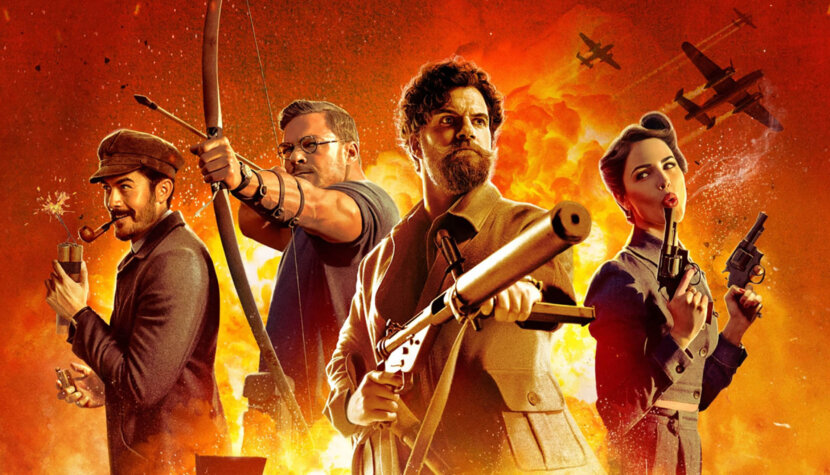“Ministry of Ungentlemanly Warfare”. 1001 Ways to Send Nazis to Heaven

German viewers must possess a titanic sense of self-distance to endure so many films that explore all possible ways of killing Nazis, who, after all, were mainly Germans. Now, Guy Ritchie has taken them on in a style somewhat reminiscent of Quentin Tarantino’s “Inglourious Basterds.” It’s juicy, without taboos, and witty, though in the director’s characteristic style. I’ve written about Ritchie many times and feared that “Ministry of Ungentlemanly Warfare” would be chopped up with explanations, title cards, and convoluted flashbacks, like the wasted “The Gentlemen.” Yet, it’s not that bad. Guy Ritchie heeded my pleas and slowed down. Prime Video didn’t crash from the overload. Ritchie is still crazy, but at least he uses film typography moderately. Generally, the action moves forward at the speed of a British destroyer off the coast of Africa, yet the viewer can keep up.
I mention Africa because a large part of the film’s action takes place on this continent, specifically in Ivory Coast. Some scenes are set on Fernando Po, now part of Equatorial Guinea, some on the Atlantic Ocean, and some in London. The action jumps across various locations almost like in a James Bond movie. It’s no coincidence that one of the characters is named Ian Fleming. However, he is much more old-fashioned and polite than Agent 007, which is intentional because the author of the James Bond books had to gather experiences somewhere, and World War II was not a world of exclusive casinos where shady financiers played baccarat without getting their hands dirty with murder. Besides, he was young. To balance this inexperience, Fleming is accompanied by a crew straight out of “Inglourious Basterds.” He is part of the brain of the operation, but the dirty work belongs to Henry Cavill and the rest of the crazies, who kill Nazis en masse and even cut out their hearts. They don’t scalp them, though, because that’s already patented by Tarantino. This is an undeniable advantage of the production – the colorful characters. The antagonist is also a character from a Tarantino film, although in that one, Til Schweiger played a Nazi killer named Hugo. Here he plays a perverted Nazi, but this time not a soldier. Let’s say a businessman, a speculator, and a dark being devoid of any positive morality. Among all these Nazis heading to the Nazi heaven en masse, he stands out quite interestingly. The fox has his den where terrible things happen.

Guy Ritchie has undoubtedly slowed down, which, at least for me, made “Ministry of Ungentlemanly Warfare” watchable. He referred to Tarantino’s “Inglourious Basterds,” which I don’t see as a flaw because it’s merely a reference, not a copy. Ritchie retained his unique style, only making it more mature. It remains light, yet simultaneously more coherent, perceptually clearer. The extended shots and greater trust in the lines spoken by the actors, without adding retrospective, explanatory descriptions, immediately paid off. Henry Cavill got the space to truly suggest to the viewers that he would be an excellent choice for the new James Bond series. This probably won’t happen, but one can always imagine what potential crossovers of Agent 007’s adventures might look like. However, one can still have the same reservations about the operatic, slapstick, and simultaneously solemn music that shouts at viewers at the most unexpected moments. It’s as energetic as if performed by an orchestra of hypnotized musicians who drank 1,000 cups of coffee. For Ritchie, the camera also behaves more politely. It doesn’t change angles, doesn’t show the image upside down, doesn’t make sudden turns. At times, it’s even too static, regardless of whether the director is Guy Ritchie or some other lesser director. Ritchie will always be associated with crazy editing and narrative tricks, not necessarily justified by the content, and with music that is a hallmark of his films, just like those directed by Woody Allen.

“Ministry of Ungentlemanly Warfare” cost 60 million dollars. So far, it hasn’t even earned half of that. I don’t think it’s possible. The bubble filled too much with the promise that this would be a production that could be called a prequel to the James Bond series. It cannot. It’s too lacking in good taste, and its lightness is too juvenile, although I admit it brings joy at times. Ritchie stands in a split between comedy and war exploitation. A Bond film shouldn’t be so indecisive. Even the Nazi killing scenes lacked that Tarantino sharpness. There was too much comedy in them. Ritchie could have taken a risk and gone further or not winked so much at “Inglourious Basterds.” Such great potential of Til Schweiger was wasted by one prematurely fired bullet. The final suspense dissipated with the arrival of the British destroyer and then the prison. Two hours of the screening turned out to be too short a time for the story to develop, although it had a chance when the real action began. A 5/10 will be a sufficient rating to appreciate the director’s efforts and the excellent duo of Henry Cavill and Alan Ritchson, but also to note that Ritchie again plagiarized himself, as if afraid to go further in his work, into uncharted oceans.

